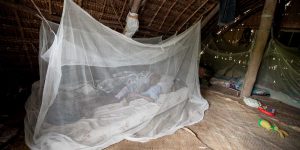Insecticidal Bed Nets Contribute to Resistance in Bed Bug Populations
(Beyond Pesticides, January 5, 2022) The use of insecticidal bed nets (IBNs) to prevent mosquito bites in malaria-endemic communities can result in resistance developing in secondary pests like bed bugs, according to research published in Parasites and Vectors. Decreased efficacy against bed bugs and other non-mosquito pests may result in misuse of both mosquito adulticides and bed nets, hampering efforts to stop the spread of malaria and other insect-borne disease. With resistance following a predicable pattern in both disease-transmitting and secondary pests, there is a critical need to embrace safer, nonchemical solutions, including both ecological and structural approaches to pest management. Researchers investigated the efficacy of untreated bed nets along with those treated with the commonly used synthetic pyrethroids deltamethrin and permethrin against both a population of insecticide-susceptible and pyrethroid resistant bed bugs. Insecticidal netting was secured between two glass jars in both an aggregation and blood meal experiment. For the aggregation experiment, fully fed bed bugs were set up to cross through the bed net to reach a darker resting location. With the blood meal experiment, unfed bed bugs were set up to cross the netting to receive a blood meal. Both experiments show the bed nets carrying little … Continue reading Insecticidal Bed Nets Contribute to Resistance in Bed Bug Populations
